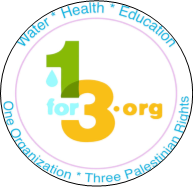FAQs
What is 1for3?
Founded in 2010, 1for3, a section 501(c)(3) registered non-profit organization in Massachusetts, partners with organizations on the ground in the West Bank, Palestine to offer bold, community-based solutions to improve the lives of Palestinian refugees.
How is 1for3 different from other nonprofits supporting Palestinians?
1for3 works in partnership with refugee communities in the West Bank. Our programs are developed and implemented with and by local colleagues rather than by donors. We have a long-term commitment to the refugee community of the West Bank. Executive director of 1for3, Nidal Al-Azraq, grew up in the UN-run Aida refugee camp located in Bethlehem and maintains strong ties with the community.
What is 1for3’s privacy policy and how does it offer privacy protections to donors?
1for3 uses a trusted online donation provider named Classy.com. Classy uses a secure cloud architecture and multiple security measures to protect sensitive data. Read here for more details on how Classy protects your data.
I can’t donate money right now, how else can I partner with 1for3?
There are many ways you can support us! Join our community by attending a webinar, walking in our 5K, or, when we are able to, coming to one of our local events.
Can I use Facebook’s fundraising tools to raise money for 1for3?
The best way to donate to 1for3.org is through Classy. We welcome any fundraising campaigns you’d like to take on for us - feel free to share our website and social media.
Why should I give to 1for3?
Everything we do is focused on strengthening Palestinian community. We believe that by do so, Palestinians will be able to overcome the military occupation, achieve the right of return, and build a bright future. So, why should you give to 1for3? Here are five good reasons.
1. We are professional.
We are registered charity in the US, donations are tax deductible, and we have a track record of over 10 years of success.
2. We work with the neediest communities in Palestine: refugees.
Refugees in Palestine are marginalized politically, economically, geographically, and legally.
3. We are efficient.
With only 1 US-based employee, we prioritize getting donated funds to programs in Palestine.
4. We are partner based.
We work with community-based organizations run by refugees over the long term. This means we factor local ideas, interests, and assessments into everything we do.
5. We have impact.
H4P (Health for Palestine)
· A new office in Balata camp (H4P Balata), the largest refugee camp in the West Bank
· Balata camp community: 35,000 people, living in a density of 140,000 per square kilometer
· Balata camp health: 4 UN doctors, 200-500 patients seen by each per day, 5000 families in care
· H4P Aida Camp, nearly 10,000 home visits conducted since 2018
· 22 young Palestinians trained as community health workers trained
· 13 trained community health workers employed
· 173 patients currently being served
· Partnership with doctors from Harvard Medical School, Cornell Medical School, and UMass Medical School
Zahrat Al-Yasmeen Kindergarten
· 50, 4-and-5-year-olds being taught in Zahrat Al-Yasmeen Kindergarten, UN-run Aida refugee camp
· 6 teachers and 1 director provide excellent teaching and student nurture
Hydroponic Urban Garden
· Hydroponic rooftop garden spanning ( 4M H x 5M W x 10M L ) provides crops to the local community
· 10 years of supporting the urban growing in 2 Palestinian UN-refugee camps
· 130, mostly women, trained in hydroponic agriculture
· 50 micro-hydroponic growing towers distributed to trained gardeners
In-Palestine Employment
· 29 staff (23 women, 6 men) all of whom are under 30 years of age
· Jobs provide salaries, health benefits, and training to strengthen and support the community
· Each employee takes care of approximately 5 people
